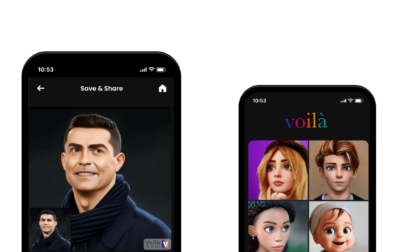Cross-Platform vs Native Development: What to Pick in 2024?
01.
With all the enormous amounts of information about different software development approaches, it may be hard to decide what strategy to go for. In this post, we’ve gathered the nuts and bolts of two primary development styles in 2024. Below you can find everything you need to know to make the right choice for your product.
Nowadays the competition in the business landscape is becoming more and more rigid, and businesses have to be more and more considerate about their digital parameters. It is estimated that in-app advertising and premium downloads would bring in over 935 billion dollars for mobile apps in 2024. At this point, it has become critically vital to choose the perfect app development model to stand out. We’ve created a useful guideline on how to choose the optimal technology strategy for your project: native or cross-platform, so you can eventually decide whether to go with one or the other that aligns with your particular needs and objectives.
In this article, we will explain the main factors to take into consideration when choosing between these two and describe the essence of each development type as well as pinpoint their strong and weak sides.
02.
How to Understand What You Need
Before diving into the nuances of each development model, it is crucial to pay attention to unobvious yet indispensable factors to make an informed choice as it has far-reaching effects on the technology utilized to develop the app, its design, and eventually the consumers who can use it.
Therefore, it’s highly recommended to thoroughly think over the following questions before rushing into the development stage:
- Which mobile platforms Android, iOS, or both does your target market mostly use?
- Which devices web, mobile, or both will the app you create function on?
- What features would your app offer?
- What is your project’s prearranged budget?
- What timeframes do you allocate?
- Do you intend to upgrade or enhance your mobile product in the future?
- What industry is the focus of your endeavor?
You’ll be in a better position to arrive at conclusions after you have a definitive reply to each of these points. Such deep analysis will help to define your main goals and weak spots, and the development direction itself that will affect the whole result in the end. Now, let’s uncover all the subtleties and possible benefits of each approach.
Dramatic Growth
03.
Native App Development
Native app development is built specifically for a mobile platform or operating system, such as iOS or Android. It’s created with platform-specific programming languages, instruments, and frameworks. Native apps make full use of the device’s functions and capabilities, ensuring maximum adaptability, flexibility for updates, peak performance, and great user experience. They are tailor-made apps that take full advantage of all their chosen platform’s capabilities.
Speaking of technology stacks, Java or Kotlin is used for Android, and in the case of iOS, Objective-C or Swift is used. Making use of these acceptable languages ensures a perfect match between the apps and platforms.
Famous Examples
- Google Maps
- Tesla
- Spotify
- Waze.
Pros:
- Optimal Functionality: Due to their close integration with the hardware and operating system, native apps deliver the greatest efficiency. And the fact that native applications function flawlessly even in the absence of internet access is one of its many notable pluses.
- Great UX&UI: Users find native applications friendly and simple since they follow their respective platforms’ design and interface rules. Additionally, it is easier to adjust the user interface screen resolution, size, and pixel density, making it flexible and convenient for a wider user base.
- Utmost Performance: Because native apps are designed specifically for a given platform, they are often responsive and relatively quick. Moreover, they are more efficient since these apps are based on fundamental programming languages and APIs.
- Better Scalability: Such apps are also more scalable due to the freedom in resource management and the variety of tools presented; they leverage the full potential of the device.
- Superior Security: Since native programs utilize platform-specific built-in security capabilities, they are also more secure due to complete access to device functions. Therefore, such an approach shows much higher levels of security compared to others.
- High Speed: They also work quicker than hybrid and cross-platform apps since they don’t have that complex codebase. Since most app components preload in advance, they are presented instantly. If you plan to launch a large project, native development is a 25-30% faster option.
Cons:
- Costly and Time-Consuming: Higher development costs compared to hybrid and cross-platform approaches make this option non-affordable for startups or small businesses. However, if you choose only one platform to code, the effort will be rewarding, and in the end, users’ engagement rates will go up.
- Complicated Maintenance: In addition to development costs, it takes twice as much work to upkeep the app across various platforms. Updates, feature additions, and error fixes must be applied individually for every platform, which increases expenses.
Overall, native app development is an excellent choice if you have a complicated or long-term project that demands superior quality, extensive customization, and integration with platform-specific features, or in case you need to add device-specific functionalities and create an easy-to-learn app. It shouldn’t be confused with the hybrid one: the difference between hybrid and native app development models is that the former is platform-agnostic and multi-compatible, whereas the latter is customizable and independent.
04.
Cross-Platform App Development
An average user would want to utilize their favorite application across numerous platforms and devices. Cross-platform app development services can be beneficial in this situation as businesses can leverage one source to target various platforms. Thus, instead of developing two native apps, a single codebase can be deployed. The top cross-platform app frameworks nowadays are React Native, Xamarin, and Flutter.
Famous Examples:
- Skype
- Airbnb
- Walmart
- Discord
- Uber Eats.
Pros:
- Rapid Development: Developers may create apps for several platforms at once using solely one codebase, which significantly cuts down on development time. This quicker time-to-market is especially advantageous for companies looking to swiftly launch their apps.
- Code reusability: It is not necessary for developers to create a new code for every operating system when creating cross-platform applications. Another advantage is that working with a single codebase simplifies the process of searching and addressing bugs.
- Development costs: Businesses may utilize a single team to reduce expenses dramatically, rather than allocating resources and teams to each platform separately. Also, such an approach implies that the maintenance costs are lower as well.
- Larger Market Reach: Thanks to its broad pool of possibilities, cross-platform development is the most successful method of engaging all mobile app consumers, regardless of their platform preference.
Cons:
- Performance Trade-Off: Deploying a single strategy for two systems entails various sacrifices, and limited functionality is one of them. In comparison to native apps, cross-platform apps have lower performance levels since an additional layer of computing is needed.
- Compatibility issues: Not every platform-specific functionality is integrated by cross-platform frameworks. You may run into platform-specific problems or compatibility issues that must be fixed manually for each platform.
Nowadays this model is prevalent as it ensures a fast and cost-efficient development process and provides the ability to create simple applications. While creating cross-platform software is simple and quick, providing a comparable user experience on the target platform will require more work. The main distinction between cross-platform app vs hybrid app is that the hybrid one consists of native and web solutions.
05.
Which One to Choose?
As we’ve discussed, when releasing a new app, you have two options: a cross-platform app that fulfills several functions, or a native app for each platform. Still, even after pinpointing all the main characteristics, it may not be clear what technology must be leveraged. Both approaches sound alluring, but you might want to stick to only one of them when you clarify your number one needs and goals. Depending on what you put first in your list, your option becomes more evident:
| Outstanding Performance | Native |
| Superb Visuals | Native |
| Limited Budget | Cross-Platform |
| Specific Hardware | Native |
| Broad Audience | Cross-Platform |
| No Time to Wait | Cross-Platform |
| Testing the Market | Cross-Platform |
06.
To Draw the Line
There is no universal solution when choosing between these two approaches. The benefits of cross-platform software development include cost-effectiveness and quicker time to market. However, native app development is stronger in terms of security, hardware incorporation, execution, and customization. Another option is to use hybrid mobile app development: native app techniques for the main functionality and cross-platform technologies for other aspects. Still, partnering with experts will guarantee the effective implementation of your app concept whether you decide on native or cross-platform app development.
At Touchlane, we always focus on our client’s desires, carefully weighing the pros and cons, accounting for any potential hazards, and guaranteeing the best possible value for their money.
Tell Us About Your Project
RELATED SERVICES
CUSTOM SOFTWARE DEVELOPMENT
If you have an idea for a product along with put-together business requirements, and you want your time-to-market to be as short as possible without cutting any corners on quality, Touchlane can become your all-in-one technology partner, putting together a cross-functional team and carrying a project all the way to its successful launch into the digital reality.
If you have an idea for a product along with put-together business requirements, and you want your time-to-market to be as short as possible without cutting any corners on quality, Touchlane can become your all-in-one technology partner, putting together a cross-functional team and carrying a project all the way to its successful launch into the digital reality.
We Cover
- Design
- Development
- Testing
- Maintenance











